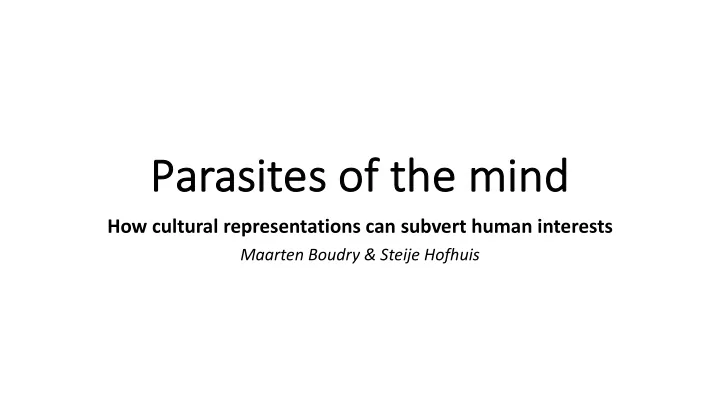

Pa Parasites of the mind How cultural representations can subvert human interests Maarten Boudry & Steije Hofhuis
An irresistible idea • Are there any such things as mind parasites ? • By analogy with biological parasites • harmful to interests of the host • Different metaphors • Viruses of the mind • Maladaptive culture • Rogue culture • Selfish memes • Cultural parasites
Yes, but… • Many versions of the idea: • Too facile & superficial • Too grandiose (“ panmemetics” ) • Confusion about role of human intentionality • Two challenges • Pinker’s challenge • Millikan’s challenge • Genuine mind parasites • Systems of misbelief (doxastic parasites) • Case study: witchcraft in early modern Europe
Diverging interests • In biology: • Symbionts • Mutualists • Commensals • Parasites • Respective genetic interests • In culture: subverting the interests of the host • But how could “memes” be parasites? • These are our ideas, representations, practices, rituals!
Pinker’s Challenge: Blind design? “A complex meme does not arise from the retention of copying errors … It arises because some person knuckles down, racks his brain, musters his ingenuity, and composes or writes or paints or invents something”.
No. Many are not our ideas • Pinker’s challenge has been met • Much adaptive design is “unauthored” (Henrich 2015) • igloos, canoes, folklore tales, folk medicine, marriage institutions, recipes • Slowly accumulated over time • People have no clue about the rationale • Good news (not just for memetics)
Millikan’s challenge: Novel purposes? • “Part of what they have been selected for is their ability to be reproduced accurately through the medium of human minds. But this does not subvert their essentially human purposes . ... The memes have merely fed these interests a much richer diet than if each person had to invent all of his own amusements, or invent all of the entertainments he uses to invoke the gratitude and appreciation of others.” (Millikan, 2004, pp. 18-19)
Purposes of culture • Derivative of human purposes • So what’s the point? • Superflous (‘The meme of E=mc² has high reproductive success’) • Frivolous (‘The cake recipe has manipulated human vectors into spreading it’) • Conspiratorial (‘We are zombies controlled by our memes’) • Panmemetics (Blackmore, Aunger, Stanovich…)
Subversion of interests? • Dennett on “prototypical” memes: words ü Designed by blind, purposeless evolution ü Discrete ü Digitized ü Bottom-up But: v Words are mutualists - useful, convenient, informative, interesting v Interests of meme and hosts coincide
Can we do better? • Can we find really selfish memes? • Or cultural parasites/viruses • Important distinction • Cui malo? Who suffers? • Harmful to whom ?
Cui malo? Me or my genes? • The idea of celibacy is a “parasite meme” (Delius, Dennett) • Careful deliberation • Maladaptive culture • “If you want to improve your kids’ genetic fitness, for goodness sake don’t help them with their homework!” (Boyd & Richerson) • Of course they would never heed this advice! • My genes don’t like contraceptives? Too bad for them!
Doxastic parasites • Beliefs: more “infectious” than other cultural items • they command assent (doxastic involuntarism) • What are misbeliefs for ? • Hard to tell (Doxastic Catch-22) • Systems of misbeliefs • Most are quickly weeded out • Some are stubborn and resilient • They adapt to survive Boudry, M., & Braeckman, J. (2012). How Convenient! The Epistemic Rationale of Self-validating Belief Systems. Philosophical Psychology , 25(3), 341-364.
Witchcraft beliefs in early modern Europe • A “cumulative concept of witchcraft” • Diabolical pact • Harmful magic • Witches’ sabbath • Nightly flight • Crimen exceptum • Result: the witch trials • Around 50.000 people killed
Marvin Harris: “Too well designed” • A means to: • Oppress the poor • Destroy peasant culture • Combat religious opponents • Oppress woman • Create social cohesion
Current witchcraft historiography (1) • Sources do not reveal any hidden agenda or function • People were genuinely afraid • Course of the trials did not reveal this either • They occurred haphazardly • Initiative came from various groups • Victims were also highly diverse • The effects were often devastating
Current witchcraft historiography (2) • Julian Goodare • “A witchcraft accusation was not ‘really’ about something else; it was really about witchcraft.” • Wolfgang Behringer • “The astonishing misery of the trials burdened most of the commissioners psychologically, which makes the assumption that they were carried out from lower motives seem absurd.” • General conclusion • No theory works
Novel purposes • Beliefs themselves evolve • ‘Design without designer’ • Novel functional rationale • Not anchored in human interests • Subverts interests of its hosts • Answer to Millikan’s challenge • Who benefited from the witch-beliefs? The witch-beliefs!
Conclusion • Blind cultural design (Pinker’s challenge) • “Evolution is smarter than you are” (Orgel’s second rule) • People are often clueless about cultural adaptive rationales (Joe Henrich) • Novel purposes? (Millikan’s Challenge) • Cultural adaptations serve our interests (useful, nice, handy, beautiful) • Not always true • Systems of misbelief • Interests of humans and ‘memes’ diverge • We NEED notion of cultural parasites to understand European witch hunts
Recommend
More recommend